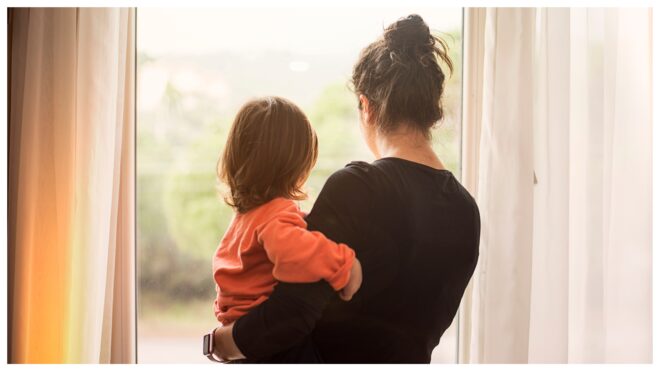
No one wants to be the parent who turns into a dragon, unleashing fiery flames of anger and frustration onto their kid who accidently spilled a glass of juice. But it happens. Between the stress of being a parent, the pandemic, work, and life, parents are on mental overload. Even parents who are therapists must work at maintaining their mental health.
Michelle Felder — mom to a 6-year-old and an 8-year-old and a licensed clinical social worker, therapist, and founder of Parenting Pathfinders — understands the predicaments from both ends.

She reveals to LittleThings, “I find bedtime to be a very hard and triggering time of the day. Because of the stress I felt, this daily routine became a time of stress for everyone in my family. At the end of the day, it feels like my tank is virtually empty. I’m usually exhausted, and I just want my kids to go to bed. I noticed that I became easily frustrated by the little things that happened or by how long things took because my threshold was so low – and I realized that I had to raise my threshold and manage my expectations of what bedtime will look like in my home.”
So she turned to mindfulness. “I started to do yoga while my kids brushed their teeth and got ready for bed, and this nighttime yoga practice not only helped me to stay calm and present, but it became something that they wanted to finish getting ready in order to be able to join,” she shares. “I found that if I did more than just wait around for them to be done getting ready for bed, I was able to move through that time with more ease. I channeled my frustrations into something positive and productive, which resulted in a total shift in our bedtime experience, and it now allows me and my children to have a fun and positive experience together before they go to sleep.”
Dr. Monica Vermani, clinical psychologist and author of A Deeper Wellness, agrees that you can begin taking charge of your mental health by taking small, actionable steps. “Carving out even small amounts of time for yourself — even 5 to 10 minutes a day — for a breathing exercise or making a gratitude log can make a big difference,” she recommends. “Make a note of which aspects of your mental health you would like to improve. Come up with or seek professional help, where you will find support to change them. Build in support and accountability by confiding in trusted friends who will help keep you on track.”
Little tweaks like that can make a difference in your day, but sometimes it’s difficult to determine between stress or a bigger mental health concern, notes Vermani.
According to Vermani, you should seek the help of a mental health professional if you experience any of the following:
- You find the stress of the pandemic is inhibiting your day-to-day life, holding you back from work/school, social, intimacy, self-care, finances, and spirituality.
- You are withdrawing and isolating yourself, you avoid leaving the house an amount that is detrimental, you’re not exercising and having poor physical health — and using more substances.
- You can’t stop watching the news and checking COVID numbers, and you think about COVID all the time.
- You overuse technology.
- You have suicidal thoughts from existential issues of not seeing the point in life and are not seeing the good amongst the challenges.
Getting in check with our mental health will have a positive impact on our kids. Felder says, "How we respond to our kids has more to do with how we’re feeling than with what they’re doing, and so our healthy responses to them are dependent on whether we’re emotionally healthy ourselves. Talking with my therapist, exercising regularly, and practicing mindfulness through yoga and meditation have been instrumental in my ability to balance my mental health.
"I’m also helped by weaving mindfulness into ordinary moments throughout the day, and being intentional about noticing what's happening in the present moment; I bring my attention to the sounds, textures, and sensations I experience as I walk, eat, or drink a glass of water mindfully. I may even just take a moment to pause and check in with myself to see how I’m feeling and what I may need; taking a mindful minute to sit still helps me to reset and keep my mind balanced."
Felder also intentionally creates space for self-compassion, adding, “I’ll do this by closing my eyes, taking a deep breath, and acknowledging that what I’m going through is hard. I’ll remind myself that I'm not alone and that others feel this way too, and then I’ll say something kind to myself, like, ‘May I be kind and gentle with myself,’ ‘This will pass,’ or I’ll even tell myself, ‘I love you, you’re doing your best.’ Something that has helped my entire family to find more mental balance is having ‘quiet time’ each day. This is a time when everyone at home does something quietly and independently. Whether it’s 20 minutes or an hour, this is a wonderful opportunity for us all to emotionally recharge.”
When that fire-breathing dragon within you begins to spark, Dr. Vermani says there are a few things parents can do to tame the overwhelming emotions:
- Have compassion for yourself, others, and divergent opinions.
- Remind yourself to respond rather than react to others.
- Get physically active. Getting your mind off something and getting physical can decrease anxiety. If it’s possible to do that activity with your kids, great.
- Take a moment for yourself. De-stress away from whatever is overwhelming you.
- Speak to someone to help you reframe your judgments and negative thoughts that are fueling your anger.
- Choose to take a moment. Find a soothing, calming activity that works for you. Then respond to your child mindfully, with compassion, rather than reacting negatively in the moment.
- Engage in positive self-talk. Feeling angry is a normal part of being a parent and a human. Don’t feel shame for your feelings. You can feel guilty for making a mistake or lashing out, but don’t let it change your self-esteem.
- Channel anger/frustration into physical activity. Schedule some time to release some of that pent-up energy through physical exercise.
- Get real with yourself and your kids. If you lose your temper with your children, apologize. Be honest, and explain what was going on with you when you lost your temper. (Were you tired, hungry, struggling to meet a deadline, worried about something?) Let them know you will work hard at doing better. Involve them in a discussion about you could have responded differently. Have compassion for your children and for yourself. Show them that it is human to make mistakes and that we can all forgive, learn, and grow through our mistakes.
Felder says that “being able to express anger in a healthy way is a skill, and children benefit when their parents develop and strengthen this skill. It’s helpful to begin by getting in touch with what’s underneath the anger. Usually anger is the tip of the iceberg, and there’s more things like not feeling appreciated, childhood experiences, loneliness, or a general sense of being overwhelmed that’s underneath and being expressed as anger.”
She continues, “I encourage folks to pause in the moment and be more conscious of the thoughts that you have when you’re angry; are these thoughts rooted in fears, worries, or unhelpful narratives from your childhood? Becoming aware of the root of our anger is instrumental in managing it. Something that can also help is coming up with calming strategies before you’re angry so you know what to do when the moment hits.
“Decide how you would rather express your anger, and set the intention to act accordingly. In the moment when you’re feeling angry or noticing that you’re reacting in a way you don’t want to be, pause — literally stop what you're doing, stop speaking and close your eyes if you need to, and then take three deep breaths and ask yourself, ‘How am I feeling right now?’ and then, ‘How do I want to treat my child right now?’ There is so much power in this pause; it creates space for us to respond intentionally instead of reacting in these emotionally charged moments.”
Paying attention to your emotional triggers – the types of things tend to put you over the edge – is also a helpful tool.
“With this awareness comes the ability to get ahead of those things, make changes, and make space for you to have a healthier response next time,” explains Felder.
She sums it up with, “We can’t give our children what we don’t possess, and so it’s essential that we first find peace and calm within our own lives if we want to bring peace and calm to how we parent our children.”
Use these strategies, and we can keep fire-breathing dragons from hatching a new generation.







